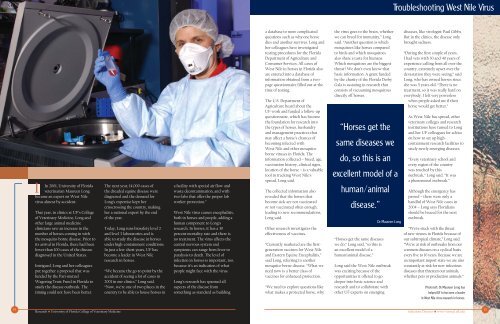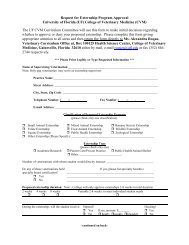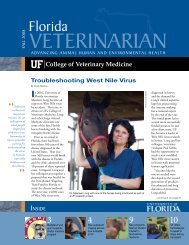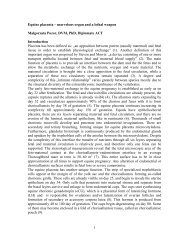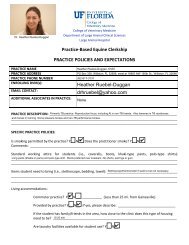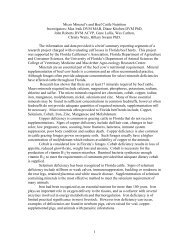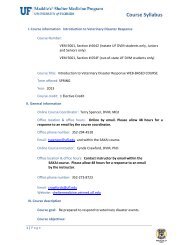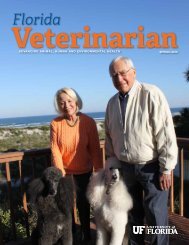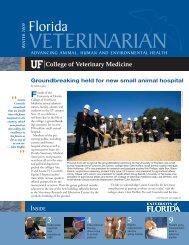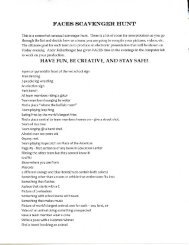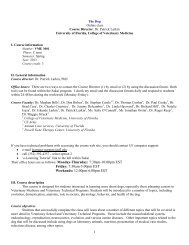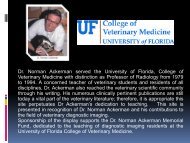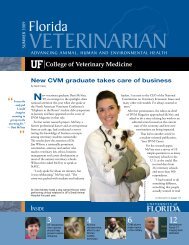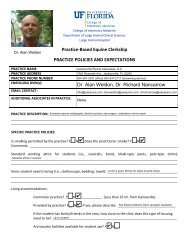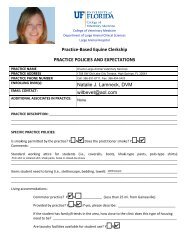College of Veterinary Medicine Research Brochure
College of Veterinary Medicine Research Brochure
College of Veterinary Medicine Research Brochure
- No tags were found...
You also want an ePaper? Increase the reach of your titles
YUMPU automatically turns print PDFs into web optimized ePapers that Google loves.
Troubleshooting West Nile VirusIIn 2001, University <strong>of</strong> Floridaveterinarian Maureen Longbecame an expert on West Nilevirus almost by accident.That year, in clinics at UF’s <strong>College</strong><strong>of</strong> <strong>Veterinary</strong> <strong>Medicine</strong>, Long andother large animal medicineclinicians saw an increase in thenumber <strong>of</strong> horses coming in withthe mosquito-borne disease. Prior toits arrival in Florida, there had beenfewer than 100 cases <strong>of</strong> the diseasediagnosed in the United States.Intrigued, Long and her colleaguesput together a proposal that wasfunded by the Pari-mutuelWagering Trust Fund in Florida tostudy the disease outbreak. Thetiming could not have been better.The next year, 14,000 cases <strong>of</strong>the dreaded equine disease werediagnosed and the demand forLong’s expertise kept hercrisscrossing the country, makingher a national expert by the end<strong>of</strong> the year.Today, Long runs biosafety level 2and level 3 laboratories and isable to study the disease in horsesunder high-containment conditions.In just a few short years, UF hasbecome a leader in West Nileresearch in horses.“We became the go-to point by theaccident <strong>of</strong> seeing a lot <strong>of</strong> cases in2001 in our clinics,” Long said.“Now, we’re one <strong>of</strong> two places in thecountry to be able to house horses ina facility with special air flow andwaste decontamination, and withtwo labs that <strong>of</strong>fer the proper labworker protection.”West Nile virus causes encephalitis,both in horses and people, adding ahuman component to Long’sresearch. In horses, it has a 30percent mortality rate and there isno treatment. The virus affects thecentral nervous system andsymptoms can range from fever toparalysis to death. The level <strong>of</strong>infection in horses is important, too,because it’s an indication <strong>of</strong> whatpeople might face with the virus.Long’s research has spanned allaspects <strong>of</strong> the disease fromsomething as standard as buildinga database to more complicatedquestions such as why one horsedies and another survives. Long andher colleagues have investigatedtesting procedures for the FloridaDepartment <strong>of</strong> Agriculture andConsumer Services. All cases <strong>of</strong>West Nile in horses in Florida alsoare entered into a database <strong>of</strong>information obtained from a twopagequestionnaire filled out at thetime <strong>of</strong> testing.The U.S. Department <strong>of</strong>Agriculture heard about theUF work and funded a follow-upquestionnaire, which has becomethe foundation for research intothe types <strong>of</strong> horses, husbandryand management practices thatmay affect a horse’s chances <strong>of</strong>becoming infected withWest Nile and other mosquitoborneviruses in Florida. Theinformation collected – breed, age,vaccination history, clinical signs,location <strong>of</strong> the horse – is a valuabletool in tracking West Nile’sspread, Long said.The collected information alsorevealed that the horses thatbecome sick are not vaccinatedor not vaccinated <strong>of</strong>ten enough,leading to new recommendations,Long said.Other research investigates theeffectiveness <strong>of</strong> vaccines.“Currently marketed are the firstgenerationvaccines for West Nileand Eastern Equine Encephalitis,”said Long, referring to anothermosquito-borne disease. “What weneed now is a better class <strong>of</strong>vaccines for enhanced protection.“We need to explore questions likewhat makes a protected horse, whythe virus goes to the brain, whetherwe can breed for immunity,” Longsaid. “Another question is whichmosquitoes like horses comparedto birds and which mosquitoesalso share a taste for humans.Which mosquitoes are the biggestthreat? We don’t even know thatbasic information. A grant fundedby the charity <strong>of</strong> the Florida DerbyGala is assisting in research thatconsists <strong>of</strong> vacuuming mosquitoesdirectly <strong>of</strong>f horses.“Horses get thesame diseases wedo, so this is anexcellent model <strong>of</strong> ahuman/animaldisease.”“Horses get the same diseaseswe do,” Long said, “so this isan excellent model <strong>of</strong> ahuman/animal disease.”Dr. Maureen LongLong said the West Nile outbreakwas exciting because <strong>of</strong> theopportunities it <strong>of</strong>fered to godeeper into basic science andresearch and to collaborate withother UF experts on emergingdiseases, like virologist Paul Gibbs.But in the clinics, the disease onlybrought sadness.“During the first couple <strong>of</strong> years,I had vets with 30 and 40 years <strong>of</strong>experience calling from all over thecountry, extremely upset over thedevastation they were seeing,” saidLong, who has owned horses sinceshe was 5 years old. “There is notreatment, so it was really hard oneverybody. I felt very powerlesswhen people asked me if theirhorse would get better.”As West Nile has spread, otherveterinary colleges and researchinstitutions have turned to Longand her UF colleagues for adviceon how to set up highcontainmentresearch facilities tostudy newly emerging diseases.“Every veterinary school andevery region <strong>of</strong> the countrywas touched by thisoutbreak,” Long said. “It wasa phenomenal outbreak.”Although the emergency haspassed – there were only ahandful <strong>of</strong> West Nile cases in2004 – Long says Floridiansshould be braced for the nextoutbreak.“We’re stuck with the threat<strong>of</strong> new viruses in Florida because <strong>of</strong>our subtropical climate,” Long said.“We’re at risk <strong>of</strong> outbreaks from ourcommon diseases on a cyclical basisevery five to 10 years. Because we arean important import state we are alsoconstantly at risk for new infectiousdiseases that threaten our animals,whether pets or production animals.”Photo left: Dr. Maureen Long hashelped UF to become a leaderin West Nile virus research in horses.14<strong>Research</strong> • University <strong>of</strong> Florida <strong>College</strong> <strong>of</strong> <strong>Veterinary</strong> <strong>Medicine</strong>••Infectious Diseases • www.vetmed.ufl.edu15


